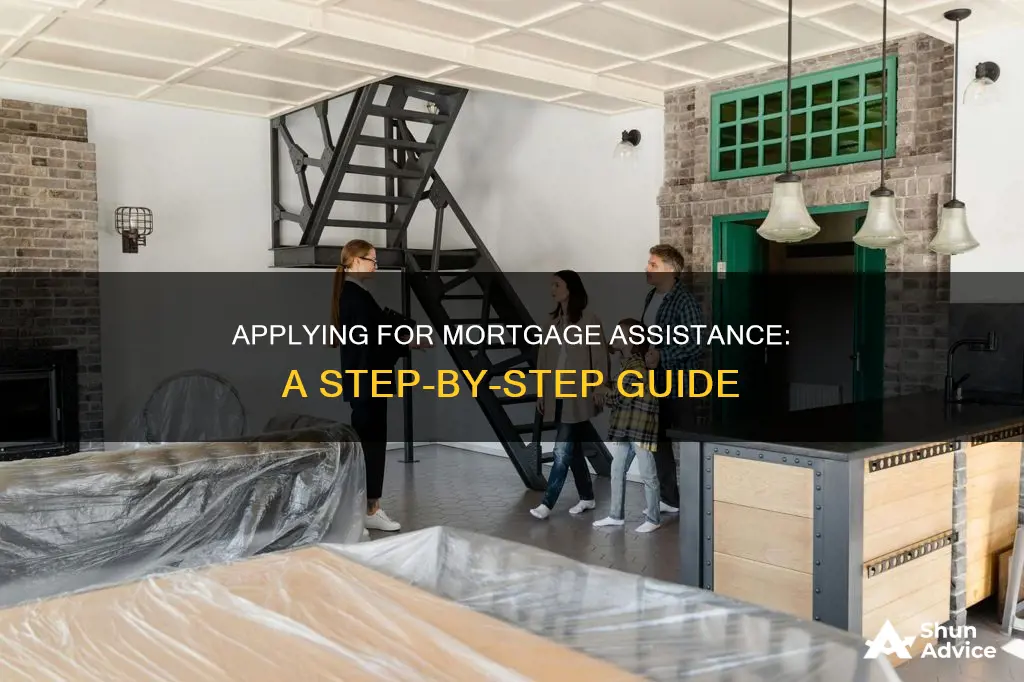
If you are looking to buy a home, mortgage assistance programs can help you secure a loan. The federal government does not offer grants or free money to individuals looking to buy a home, but there are several government-backed loan programs that can help. The Federal Housing Administration (FHA) manages the FHA loan program, which helps homebuyers by insuring their loans so lenders can offer lower down payments and closing costs. FHA loans offer assistance to first-time homebuyers, seniors who partially or fully own their home, and those buying a manufactured or mobile home. The Homeowner Assistance Fund (HAF) is another program that provides support to homeowners facing financial hardship. HAF is overseen by the U.S. Treasury Department and administered by states, territories, and tribes. Additionally, if you live in a rural area, you may qualify for home loans through the U.S. Department of Agriculture's (USDA) single-family housing programs.
| Characteristics | Values |
|---|---|
| Mortgage assistance programs | FHA loans, USDA loans, VA loans, HAF, EEMs, down payment assistance programs |
| Who is eligible for mortgage assistance? | First-time homebuyers, seniors, American Indian and Alaska Native families, veterans, low-income homeowners, homeowners facing financial hardship due to COVID-19, etc. |
| What does mortgage assistance cover? | Mortgage payments, homeowner's insurance, utility payments, property taxes, partial claims, closing costs, etc. |
| How to apply for mortgage assistance? | Online application, mail, or fax. Contact a HUD-approved housing counseling agency for guidance. |
| What documents are required? | The document requirements vary. The mortgage assistance application lists the required documents. |
What You'll Learn

Government-backed home loans
If you're looking to buy a home, a government-backed home loan could be a great option. These loans are designed to help make homeownership more accessible and affordable. Here's a guide to government-backed home loans, with a focus on the Federal Housing Administration (FHA) loan program:
Federal Housing Administration (FHA) Loans
The Federal Housing Administration (FHA), part of the Housing and Urban Development (HUD) department, manages the FHA loan program. This program has been helping people become homeowners since 1934. Here's how it works:
- Insured Loans: The FHA insures the loans, so lenders can offer borrowers lower down payments and closing costs. This makes it easier for those who might not have the funds for a large down payment to get a mortgage.
- Assistance for First-Time Homebuyers: FHA loans are particularly beneficial for first-time homebuyers, as they have a lower credit score requirement than most home loans.
- Senior Citizen Benefits: The FHA also offers assistance to seniors who own their homes partially or fully. The FHA Reverse Mortgage program allows seniors aged 62 or older to convert a portion of their equity into cash.
- Energy-Efficient Mortgages: You can include the costs of energy improvements in an FHA Energy-Efficient Mortgage, making your home more environmentally friendly.
- Mobile and Manufactured Homes: FHA financing is available for mobile homes and factory-built housing, as well as traditional single-family homes.
To apply for an FHA loan:
- Visit the HUD website to find your state housing finance agency (HFA) and learn about local homebuyer assistance programs.
- Find an FHA-approved lender and ask them about FHA loan products.
- Ensure you meet the credit score requirements and find a home that falls within the FHA loan limits for its location.
Other Government-Backed Home Loans
In addition to FHA loans, there are other government-backed loan programs that may be suitable, depending on your circumstances:
- USDA Single-Family Housing Programs: If you live in a rural area, you may qualify for a loan through the U.S. Department of Agriculture's (USDA) Single-Family Housing Programs. These include the Section 502 Guaranteed Loan Program, which assists low- and moderate-income households in eligible rural areas.
- HUD's Good Neighbor Next Door Sales Program: This program offers significant discounts on home listing prices in revitalization areas for law enforcement officers, teachers, firefighters, and emergency medical technicians.
- Energy-Efficient Mortgages (EEMs): EEMs can be used to purchase or refinance an existing or new Energy Star-certified home. They can also finance energy-efficient home improvements.
- Veterans Affairs (VA) Loans: The Department of Veterans Affairs helps veterans, surviving spouses, and service members secure home loans, including purchasing a home, refinancing a mortgage, or financing home repairs.
- Native American Direct Loan (NADL) Program: This program assists American Indian and Alaska Native veterans and those married to an American Indian or Alaska Native. It helps with purchasing, building, or improving a home.
Commercial Mortgage Application: A Step-by-Step Guide
You may want to see also

FHA loans
The first step in applying for an FHA loan is to find an FHA-approved lender. Most banks, mortgage companies, credit unions, and online lenders are equipped to provide FHA financing. You can also visit the Housing and Urban Development (HUD) website to find and contact your state housing finance agency (HFA) to learn about local homebuyer assistance programs.
After choosing your lender, the next step is the loan application. This process can often be completed online, or you may meet face-to-face with a loan officer for tailored advice. Your lender will need certain information to start the application process, including your name, birth date, Social Security number, address, and estimated income. They will then request supporting financial documents to verify your income, savings, and debts.
Underwriting is a crucial step in the FHA loan approval process. The underwriter will analyze your paperwork, credit score, and income to determine if your loan is sound. If the underwriter identifies minor issues, you may be asked to submit additional information or take action to resolve the issue, which could delay the processing time.
Before your loan is approved, an FHA inspection will be conducted by an approved appraiser who will determine the value of the home and ensure it meets HUD's minimum health and safety standards.
Adding Your Daughter to Your Mortgage: What You Need to Know
You may want to see also

Homeowner Assistance Fund
The Homeowner Assistance Fund (HAF) is a federal program that provides support to homeowners facing financial hardship due to the COVID-19 pandemic. The program is authorized by the American Rescue Plan Act and offers \$9.961 billion in assistance to help homeowners with mortgage payments, homeowner's insurance, utility payments, and other specified purposes. As of September 2024, the HAF program had delivered over \$7.5 billion in assistance to nearly 575,000 struggling homeowners, with the majority of aid going to economically vulnerable and traditionally underserved communities.
Each state has its own HAF program, and you can check if the program in your area is still accepting applications. The application process for HAF varies depending on your location, and you may need to submit additional documentation. To find out more about the application process and eligibility requirements, you can contact a HUD-approved housing counseling agency or visit the website of your state's HAF program.
It is important to note that submitting an application does not guarantee financial assistance, as some locations may receive more applications than they can fund. If you are approved for HAF, the money will typically be sent directly to your mortgage servicer, utility company, or contractor making repairs, provided they participate in the program. It is recommended to contact your mortgage servicer to discuss the process and verify their participation in HAF.
In the event that you do not meet the eligibility criteria for HAF or your state's program has run out of funds, there may still be other options available to help you stay in your home. You can reach out to a HUD-approved housing counseling agency for guidance on exploring alternative solutions and navigating the process with your mortgage servicer.
Applying for a HARP Mortgage: A Step-by-Step Guide
You may want to see also

Avoiding mortgage scams
Applying for mortgage assistance can be a daunting task, especially with the risk of scams. The mortgage industry, like any other, has its fair share of bad actors who employ various tactics to defraud unsuspecting individuals. Here are some essential tips to help you avoid falling victim to mortgage scams:
Be Wary of Too-Good-to-Be-True Offers:
Scammers often lure victims by offering extremely favourable terms that seem too good to pass up. If you come across a deal that seems too good to be true, it's important to approach it with caution. Remember that legitimate lenders will not pressure you to accept an offer or rush you through the process. Take your time to review the terms carefully and seek clarification from trusted sources.
Do Your Research:
Conducting thorough research is a powerful tool against scams. Compare different lenders, check their ratings, and review their reputations. Websites dedicated to helping individuals find the right mortgage can be a valuable resource. Additionally, consider talking to your bank or credit union to learn more about identifying predatory lenders and the red flags to watch out for.
Beware of Impersonation Scams:
Scammers sometimes pose as real estate agents or other trusted professionals to gain your trust. They may compromise the email accounts of legitimate real estate professionals to monitor their correspondences and identify potential victims. During the closing process, they may send spoofed emails with false instructions for wiring funds. Always verify payment instructions with trusted representatives in person or via a pre-agreed phone number. Avoid clicking on links or downloading attachments in emails, and never email financial information.
Understand the Common Scams:
Familiarise yourself with common mortgage scams such as loan churning and flipping. Loan flipping involves repeatedly refinancing the same loan to generate more fees for the lender. Scammers may also target borrowers preparing to close on a home loan through phishing schemes, aiming to steal banking information and redirect down payments or closing costs. Knowing these tactics will help you identify potential red flags.
Use a Mortgage Calculator:
Utilise online mortgage calculators to estimate your ideal monthly payments. These tools allow you to input various factors, such as home prices, interest rates, and down payment amounts, to give you a better understanding of your financial commitments. This knowledge will empower you to make informed decisions and recognise when something seems amiss.
Remember, the key to avoiding mortgage scams is a combination of vigilance, research, and a healthy dose of scepticism. Stay informed, trust your instincts, and don't be afraid to seek advice from reputable sources to navigate the home-buying process safely.
Adding Your Partner to Your Mortgage: What You Need to Know
You may want to see also

Loan modification
To qualify for a loan modification, homeowners typically need to meet certain requirements, such as providing proof of significant financial hardship, such as a long-term illness, sudden job loss, or a natural disaster. They also need to be at least one month behind on their loan payments or about to miss a payment. The specific requirements may vary depending on the lender and the type of loan.
The loan modification process can take between three to six months and requires a lot of paperwork. Homeowners can seek assistance from an experienced lawyer or debt relief attorney to guide them through the process and negotiate with the lender on their behalf. It is important to note that lenders are not obligated to offer loan modifications, and they will evaluate each case individually to determine if modifying the loan is in their best interest.
There are different loan modification programs available, such as the Flex Modification program for conventional loans backed by Fannie Mae or Freddie Mac, which can reduce monthly payments, extend the loan term, or lower the interest rate. For FHA loans, there are options for an interest-free loan for a portion of the balance or a loan extension. VA loans may allow missed payments to be rolled back into the loan balance, and USDA loans often offer extended terms and reduced interest rates.
It is important for homeowners to understand the potential impact of loan modifications on their credit score. While it can help them avoid the negative consequences of foreclosure, some lenders may report a loan modification as a debt settlement, which can adversely affect the borrower's creditworthiness. Homeowners should discuss with their lender how the modification will be reported to credit bureaus and seek professional advice to make informed decisions.
Adding a Co-Borrower to Your Connecticut Mortgage: What You Need to Know
You may want to see also
Frequently asked questions
There are several mortgage assistance programs available, including the Homeowner Assistance Fund (HAF), which was established to help homeowners facing financial hardship due to COVID-19. You can find out if you are eligible for HAF by selecting your state or territory from a dropdown list or clicking on your state in the map on the U.S. Treasury Department website. If you are eligible, you can apply for HAF through the online portal. You can also apply for mortgage assistance through private companies, such as Mr. Cooper, which allow you to quickly apply online.
The document requirements vary depending on the program and your individual circumstances. The mortgage assistance application will list all the required documentation.
If you are a veteran or a current or former member of the military, you may be eligible for a loan from the Department of Veterans Affairs (VA). You can also consider refinancing, a repayment plan, or loan modification.







